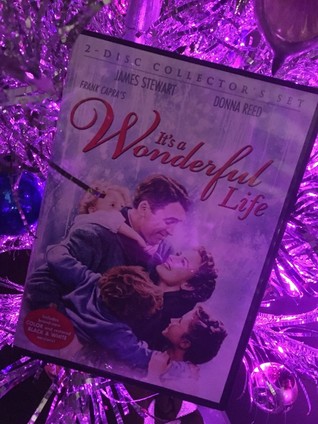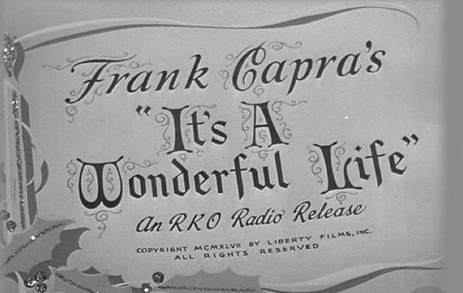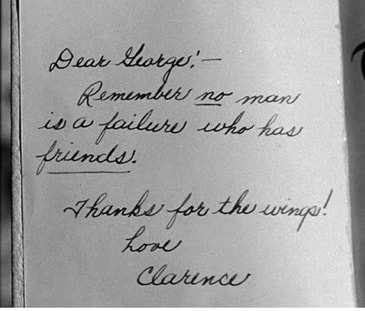|
What is it about certain stories that elevate them to the level of a timeless classic? I’ve watched many, many Christmas movies. Everything from White Christmas to National Lampoon’s Holiday Vacation. I probably should invest in one of those sweatshirts I’m seeing advertised online that reads “This is My Hallmark Christmas Movie Watching Sweatshirt.” But my all-time favorite is a classic Christmas movie called “It’s a Wonderful Life.” I don’t normally watch old films, but I’m so glad I took the time to watch this one years ago. This year, I decided to watch it with a slightly different “eye.” I wanted to try to decipher what it was that makes me want to come back and watch it, year after year. I even took notes! Spoiler alert—if you haven’t ever watched “It’s a Wonderful Life” but I’ve got you curious, and you don’t want to read about it before you get a chance to watch it—STOP READING NOW. Go watch the movie and then come back and see if you agree with me on some of the parts of the story that resonate, at least for me. The movie is set in the late 1920s and the 1930s in a small town named Bedford Falls. You know right from the beginning that George Bailey, the main character in the story, is struggling. He’s in crisis, and many people want to help him. An angel is sent down to help George. But to best do that, the angel is shown flashbacks to George’s younger years. You’ll feel transported back to an earlier time. The clothes, the cars, the speech are such a delight. We see George as a child, playing on a frozen pond in winter. The kids are sliding down hills on shovels, sliding out onto the ice. His kid brother slides too far, falling into open water, and George doesn’t hesitate to do the right thing. He jumps in to save him, catching a terrible cold and losing his hearing in one ear. We go with George to his after-school job, working in a small drug store. Two young girls, Mary and Violet, are vying for his attention but all George cares about at this stage in life are his dreams of traveling the world. George finds a telegraph on the cash register, notifying his boss of the death of his son. The man is despondent and sends George off with a prescription to deliver to a sick child. Once again, George is faced with a tough decision. Should he tell his boss he thinks the man made a mistake and risk his anger, or should he err on the side of caution to protect the sick child? George seeks advice from his father, but his father isn’t available, so he decides on his own. He chooses caution, warns his boss, and his boss becomes forever indebted to him for preventing a tragic outcome. These instances of George choosing what’s right over what’s easy or what he really wants is a theme that will play out throughout the rest of the film. His dreams of traveling the world will be delayed time and time again. George is the “good against the evils” of the world. George’s nemesis is Mr. Potter, the bitter, wealthy old man intent on taking over the whole town of Bedford Falls. Only the Bailey boys stand in his way. The battle goes on for years. We know Mary has her heart set on George from an early age, but he barely notices the younger sister of his friend until the night George’s youngest brother graduates from high school. George is coerced into dancing with Mary and finally starts to see her for the beautiful young woman she’s become. It’s a carefree night at a dance, complete with a tumble into a swimming pool housed beneath the gym floor. A walk home in the moonlight in clothes borrowed from the locker room could mean the beginning of a budding romance until George is called home because his father has had a stroke. It falls to George to decide to either take over the family business, a small Savings & Loan, and give up his plans for travel and college, or let the business his father and uncle worked so hard to build close up shop. Again, George postpones his own dreams so the business can continue and his brother can go off to college. You sense the bitterness growing in George as he begins to doubt his own time will ever come. While he is holding down the fort at home, his brother goes on to have a successful college football career, fall in love, and get married. A job offer from his new father-in-law seems to be the final straw. George is stuck at the Savings & Loan. Mary comes back from college, intent on winning George over. We cringe as George initially treats her poorly, probably because he feels she’ll tie him down even more. But love wins out, and they wed. You can feel their excitement to leave on their honeymoon, and finally, give George a chance to do some of the traveling he’s always dreamed of. But alas, they are stopped in their taxis ride to the train. There is a run on the bank which quickly escalates to a run on the Savings and Loan as well. People want to pull their savings out, but there is no cash. Their savings were invested in loans to allow people to buy homes. Wealthy old man Potter sees it as an opportunity to take over even more of the town, offering to pay fifty cents on the dollar for shares in the Savings and Loan. George is able to prevent it by using his own money, saved diligently over the years, to help the townspeople through the worst of the run. There will be no honeymoon, but there is a romantic scene where Mary creates a makeshift hotel in an old abandoned home she’s always dreamed of living in. Friends help her put up posters from some of the many tropical locations George wanted to visit his whole life. In the pouring down rain, they find happiness at home, not at some sunny location thousands of miles away. The two settle into married life and Mary supports George in his business. They start a family of their own, and they slowly help dozens of people to achieve their dreams of homeownership, all the while taking away from Potter’s pool of renters. People escape his slums to make homes in cute little bungalows. There is even a development named “Bailey Park.” We get the sense George is finally finding happiness in his life. He’s not thrilled with what he sees as limited opportunities in his career, but there is a sense of contentment. Just as George is getting comfortable, evil steps in again in the form of Mr. Potter. He wants to hire George to work for him which would get George out of his way. George is tempted by the money. But only for a minute. He quickly sees through Potter’s ploy and turns him down, but Potter doesn’t give up easily. As can happen in life, a simple mistake quickly escalates into disaster, leading to a feeling of complete and utter failure for George. And because he’s never had to ask for help in the past, it doesn’t occur to him to ask for help now. So enters Clarence. Clarence is an Angel Second Class. Poor Clarence has yet to earn his wings. But he will, if only he can help George. But George proves to be difficult to help. It isn’t until he utters his wish that he’d never been born that Clarence finds a way. The angel takes George around town to show him how different life in Bedford Falls would have been had George never lived. The town isn’t even Bedford Falls, it’s Potterville. Without George to stand in the way, the old man won. George’s brother died the day he fell through the ice. George wasn’t there to save him. Mary never married. She lived a lonely life as the town’s librarian. Their children were never born. George’s father’s business died along with him and all those people that would have escaped Potter’s slums had no alternatives. George was shocked to realize he’d positively impacted so many. He’d failed to truly appreciate how full of family, friends, and love his life had become. While George was off contemplating his own possible demise and running into Clarence, his wife Mary was seeking help. She told a few people George was in trouble and the word spread like wildfire. The whole town stepped in to help the man that had so selflessly helped them throughout the years. Together they far exceeded the amount of financial hardship George was facing.
The movie closes with a joyous scene of people helping people, and the tinkling sound of a bell ringing. And, of course, you know what that means, right? Every time a bell rings, an angel gets his wings. Now that I’ve watched the movie again, and paid particular attention to what there is about it that brings me back to it year after year, am I any closer to understanding why I enjoy it so much? I think I do understand why. For me, it’s the gift George is given of seeing what the world would be like if he’d never lived. While first seeing his life as it unfolded from his younger years to his adulthood, we understand why he feels perhaps he hasn’t lived up to his potential. He wasn’t able to get away to attend college or travel like most of his friends, and even his kid brother. He chose the traditional route of taking over the family business, marrying someone he’s known his whole life, and raising children within walking distance of his boyhood home. It seems somehow “unspectacular.” It isn’t until Clarence takes all of us on a journey of what might have been if George hadn’t lived the life he had that we come to better appreciate how he truly made the world a much better place for so many people. His selfless decisions, while they may have made him slightly bitter, helped more people than he ever imagined. Isn’t that what we all want out of life? To feel like we’ve made a difference in the lives of those that matter to us? And just like George experienced, those everyday decisions we all make will compound over time to have a positive impact on many. Sitting down to watch a movie that transports us back to a simpler time, and watching the life of someone else unfold in a way that is so similar to how many of us have grown up, reminds us all of how important each and every one of us is to our small corners of the world. We all matter. Life is a precious gift. The very best stories remind us of that fact. Kim
0 Comments
|
Kimberly Diede AuthorHello everyone and welcome to my blog! My name is Kimberly Diede and I'm a fiction author and family girl. When time permits, I am happiest with a great cup of coffee in one hand and a book in the other. I love to alternate between reading and writing. Winters here can be long, dark and cold. Summers are unpredictable, lovely and always too short. Every season of the year, as in every season of life, is a gift. Let's celebrate it together! Archives
April 2024
Categories
All
|




 RSS Feed
RSS Feed